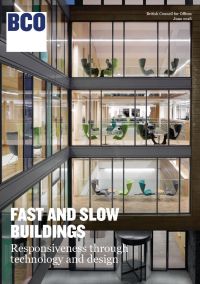BCO REPORT: FAST AND SLOW BUILDINGS
By Dan Cash
01 August 2018

Last month the British Council for Offices (BCO) launched the research document Fast and Slow Buildings: Responsiveness through Technology and Design authored by Max Fordham LLP. The study examined how the use of digital technology might improve the responsiveness of buildings. It focused particularly on the relationship between digital solutions and the approach to environmental control systems in buildings.
In the report Fast Buildings are defined as those that make extensive use of digital technology to improve the ability of a building to make decisions. This may involve enhanced occupancy sensing within spaces, using live cost data from the electricity network, or improved connectivity between systems.
Slow Buildings are defined as those that make use of thermal mass to provide a buffer, which slows the response to changes in the internal gains. While the technology used in Fast Buildings might be considered cutting edge, the technology used in Slow Building’s has been applied for centuries.
The report concluded that the provision of thermal mass in the design of environmental control strategies is always positive for ‘cooling led’ buildings with highly insulated facades as modern building regulations require. Offices fall into this bracket as the spaces generally have consistent and fairly dense occupation and predominantly require cooling. Of particular interest were activated thermal mass systems where cooling pipes are embedded within a heavyweight structure. The advantages of this approach include improved comfort, lower energy consumption, reduced maintenance and improved adaptability.
The disadvantage of slow building systems is that, as the name suggests, there can be a lag in response when changes in space occupancy lead to a change in the cooling load. Fast buildings using digital technologies to provide enhanced space occupancy sensing could allow a system to be much more predictive of usage patterns. This could allow slow building technology to pre-condition spaces according to this predicted occupancy and the weather forecast in order to reduce issues associated with lag.
A number of companies are developing systems to provide this advanced sensing. These range from camera based technologies to systems which triangulate user’s mobile phones using a building’s wifi network. Some work in conjunction with apps to provide additional functionality such as allowing users to provide feedback to the building systems about their comfort. The use of these systems will be subject to the new European General Data Protection Regulation (GDPR) so privacy is an important consideration in their deployment.
Technologies such as these will give building occupiers greater insights into their spaces. This has the potential to provide significant benefits in the form of improved space utilisation, greater flexibility to suit tenant requirements, increased staff productivity, reduced running costs through reduction in energy use, and improved sustainability through energy efficiency.
One of the key findings of the report is that the digitisation of buildings requires the breaking down of silos between building systems. Traditionally, separate communication systems are used for systems including building management, security and access control; these are now converging through use of the buildings' IT infrastructure but it is important that this also starts to happen at a software level. There is much talk around the internet of things (IoT) and the industry needs to push towards open platforms to allow buildings' systems to communicate whilst providing potential for future adaptability and ensuring data security.
Ultimately it is important that workspaces maintain pace with the ‘digitised expectations’ of building users given that smart phones are now synonymous with our interaction with the built environment, from paying for coffee to ordering a taxi…
The full report is available here:
Dan Cash is a Team Leader in our London Office and can be contacted on 020 7267 5161 and by email at d.cash@maxfordham.com





.jpg)
Comments
Add a comment